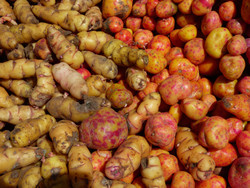EU-Latin America collaboration promotes traditional Andean foods
The Andean region hosts a wide array of ecosystems and civilisations, resulting in agricultural and food diversity. Many traditional Andean foods offer novel and desirable health benefits due to this diversity and the many different fermentation processes used there. The µ-ANDES (Microbiota of Andean food: Tradition for healthy products) initiative worked to bring together food microbiologists, technologists and agronomists as well as molecular biologists from EU and Latin American research institutions. The consortium aimed to strengthen research partnerships by focusing research on traditional Andean fermented foods. Nearly 50 researchers completed research exchanges across 6 institutes in Latin America and Europe. This led to an informal network of food microbiology researchers by the end of the research period. µ-ANDES principally studied the microbial biodiversity of Andean foods. The team studied: traditional fermented potato-based food (tocosh and tunta) and corn-based food (chica de jora) from Peru; fermented beverage xocoatolli from Mexico; and llama meat, amaranth and quinoa-based fermented products from north-western Argentina. Using a number of advanced molecular biology techniques, the team characterised the microbiota of chica, tocosh, fermented llama-meat sausages, quinoa and amaranth sourdough, and tunta. Microbes responsible for the fermentation activities (bacteria and yeast) were isolated and characterised, with the aim of understanding the biodiversity of these complex microbial communities. µ-ANDES defined more than 1 000 species of microbe, which were stored in a culture collection for future work. These studies provide information about food quality as well as features of the microbes such as antifungal activity, vitamin production and antibiotic resistance. The team also produced guidelines for Andean foods to comply with EU regulations. The research and collaborations of µ-ANDES has generated new knowledge on Andean foods with a view to future commercial exploitation. Perhaps more importantly, it has established meaningful research networks between Latin America and the EU in food science.
Keywords
Andean foods, microbial diversity, fermented foods, healthy products, molecular biology

